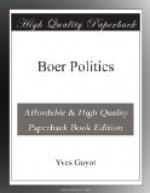3.—Pretended Concessions.
The changes referring to the “redistribution” of seats in the Volksraad were numerous. Mr. Krueger posed as making a huge concession to mining districts in raising the number of seats to twelve; but six of these were for the second Volksraad. Now the second Volksraad must always have the same number of members as the First; thus the apparent concession was merely a valueless automatic arrangement, for it is well understood that the second Volksraad is simply a show institution, devised in 1890. The various schemes for redistribution lead one to the conclusion that the number of members in the First Volksraad were to be in inverse ratio to the population.
The Uitlander looked with mistrust upon a law voted one day which could be modified the next by a simple resolution of the Volksraad; he considered it an illusion which might vanish at any moment Mr. Krueger and his friends thought proper.
4.—The Joint Commission.
The British Government might have replied that it did not recognise this law, and have confined itself to the proposals put forward by Sir Alfred Milner at the Bloemfontein Conference. It did not take this attitude which, in France, would have been advised by the most half-hearted of our Nationalists, had the French Government been engaged in similar negotiations.
In his despatch of July 27, Mr. Chamberlain appears to think that “the concessions made to the Uitlanders to guarantee them something of the equality promised them in 1881 were made in good faith; but this law of July 19th is full of complicated details; he therefore proposes that it should be examined by a joint commission.” In the Colonial Secretary’s despatch of August 2nd to Pretoria, he adds: “It is understood that the Commission to examine into the question of the Uitlanders’ Electoral rights shall be prepared to discuss every subject that the Government of the South African Republic may desire to bring before it, including arbitration, exclusive always of the intervention of Foreign Powers.”
5.—Bargaining.
The Government of Pretoria had put the law in force without waiting to consider these remarks.
On August 15th a despatch of Sir Alfred Milner’s makes mention of a proposal of the State Attorney to the British Government to waive their invitation to a joint enquiry, in respect of the concession of a retrospective Franchise of seven years being substituted for mere naturalisation, and of an increase in the number of seats. Such a proposition on the part of the Government of Pretoria shows plainly that it wished to evade enquiry into a law so fettered with formalities that its working was chimerical. And when Sir Alfred Milner referred to his proposal at Bloemfontein, the State Attorney decreased to five years the term of retrospective registration, gave eight seats to the Rand, and two to other mining districts.




